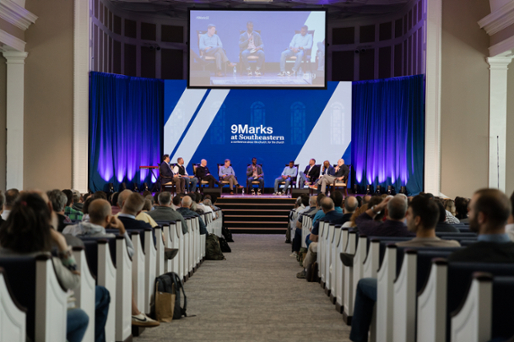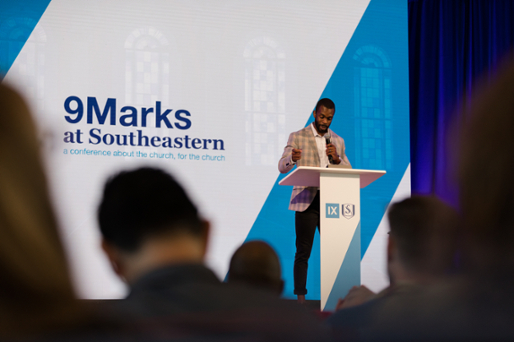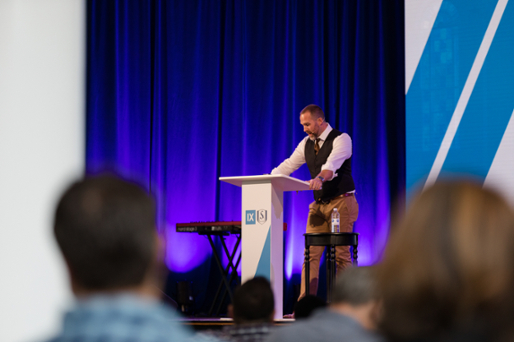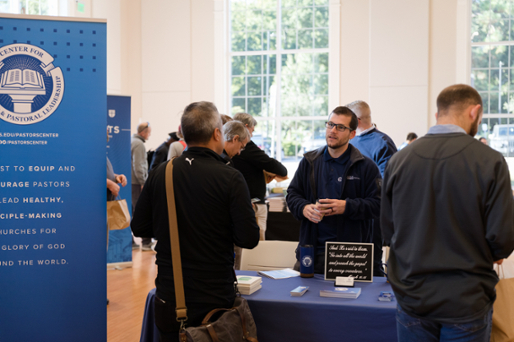Pursuing Healthy Churches: 9Marks at Southeastern Returns to Campus
Chad Burchett | September 24, 2022

On September 23-24, Southeastern Baptist Theological Seminary (SEBTS) welcomed 508 registered attendees to the 9Marks at Southeastern Conference, which featured an overview of all nine marks of a healthy church.
 Returning to campus for the first time since the COVID-19 pandemic, the 9Marks at Southeastern Conference featured speakers familiar to the 9Marks circuit and other first-time speakers — all representing a commitment to establishing healthy churches. “What we are aiming to do over these two days is help our churches be sounder and healthier,” shared Mark Dever, President of 9Marks, during his opening remarks.
Returning to campus for the first time since the COVID-19 pandemic, the 9Marks at Southeastern Conference featured speakers familiar to the 9Marks circuit and other first-time speakers — all representing a commitment to establishing healthy churches. “What we are aiming to do over these two days is help our churches be sounder and healthier,” shared Mark Dever, President of 9Marks, during his opening remarks.
In Friday’s first session, Danny Akin, President of SEBTS, addressed the topic of expository preaching, challenging pastors to reflect on the place of God’s word in their ministries. “What is your foundation for life and ministry?” asked Akin. “There is only one sure foundation: that is the word of God.” Highlighting seven reasons why pastors should preach expositionally according to 1 Timothy 3:14-4:5, Akin reminded attendees that God has inspired his word and appointed it to not only lead his people to Christ but also mature, encourage, and convict them by his Spirit. “We preach expositionally, allowing the word of God to do its work,” urged Akin. “The preacher has one assignment: to be a mouthpiece for the text.”
In the second session, H.B. Charles Jr., Pastor and Teacher of Shiloh Metropolitan Baptist Church of Jacksonville, FL, charged attendees from 1 Corinthians 15:1-4 to hold fast to a robust biblical theology, grounded in the person and work of Christ. “There are many churches that will readily affirm that the Bible is the word of God, yet they deny the Bible in their practice,” noted Charles, warning that biblical theology must permeate every aspect of a Christian’s life and confession. “Gospel doctrine matters above all else and should shape everything else,” Charles declared. “Healthy churches know what they believe, and healthy churches know why they believe it.” As Charles reminded attendees, the only proper place to stand is under the Scriptures, declaring unwaveringly the authority of the Scriptures as the word of God, the exclusivity of Christ, and the centrality of the gospel message.
Gospel doctrine matters above all else and should shape everything else.
 Addressing regeneration, conversion, and evangelism in the third session, Andy Davis, Pastor of First Baptist Church of Durham, NC, shared how unbiblical perspectives on these three distinctives leads to grave spiritual disease in local churches. Instead, healthy churches understand God’s sovereign agency in regeneration and conversion and the privilege to join in his work through evangelism. “Healthy churches believe that God alone can regenerate a sinner; therefore, they pray to the Lord to enable people’s conversion,” noted Davis. This reliance on God’s sovereign work does not excuse Christians from evangelizing, as Davis emphasized, because God commands the Church to evangelize and uses them to spiritually and strategically induce people toward conversion. “Healthy churches have a durable culture of evangelism,” shared Davis, commending earnest prayer for a heart of evangelism.
Addressing regeneration, conversion, and evangelism in the third session, Andy Davis, Pastor of First Baptist Church of Durham, NC, shared how unbiblical perspectives on these three distinctives leads to grave spiritual disease in local churches. Instead, healthy churches understand God’s sovereign agency in regeneration and conversion and the privilege to join in his work through evangelism. “Healthy churches believe that God alone can regenerate a sinner; therefore, they pray to the Lord to enable people’s conversion,” noted Davis. This reliance on God’s sovereign work does not excuse Christians from evangelizing, as Davis emphasized, because God commands the Church to evangelize and uses them to spiritually and strategically induce people toward conversion. “Healthy churches have a durable culture of evangelism,” shared Davis, commending earnest prayer for a heart of evangelism.
In session four, Omar Johnson, Pastor of Temple Hills Baptist Church of Temple Hills, MD, addressed the question, “What should mark new life in Christ?” Urging attendees to grow up in Christ in the community of a local church, Johnson reminded attendees that growth must be assessed biblically. “Where God’s good growth is rejected, sin’s gruesome growth reigns,” shared Johnson. “We are always growing. The question is: ‘In what way?’” Calling church leaders to teach, model, and cultivate biblical growth in community, Johnson emphasized the spiritual duty Christians have not only for their spiritual wellbeing but also for one another’s spiritual growth. “Encourage every member to be discipled and to disciple,” urged Johnson. “We should expect believers to act like they are. Christians make disciples.”
Where God’s good growth is rejected, sin’s gruesome growth reigns.
In Friday’s final session, Dever, who also serves as Pastor of Capital Hills Baptist Church of Washington, DC, explained the biblical precedent and expectations for church membership and church discipline. “God cares about our understanding of his truth and how we live it out together,” noted Dever. “God has chosen to maintain a distinct and separate people for his purposes and for the display of his character.” Because God has designed for his Church to live with a distinctive holiness and has commanded his Church to confront unrepentance, church discipline is a necessary part of each church’s life together before God, as Dever clarified. “If we would see our churches healthy, we must actively care for each other — even to the point of confronting,” urged Dever.

Jonathan Leeman, an Elder at Cheverly Baptist Church of Bladensburg, MD, surveyed biblical texts on church leadership and polity in Saturday’s first morning session. Defending elder-led congregationalism as biblical ecclesiology, Leeman explained how “church polity is the social dynamic of the gospel.” Drawing out the ecclesiological implications of Ephesians 4:11-12 and other passages, Leeman unfolded seven ways members are to build up the local church and three ways elders are to lead and equip members for ministry. Biblical leadership as an elder is the “repetitious work of seeing people grow in godliness,” commented Leeman, urging elders to faithfully steward their responsibility to oversee, teach, and model sound doctrine and faithful Christian living.
In Saturday’s second session, Justin Perdue, Pastor of Covenant Baptist Church of Arden, NC, addressed prayer in the context of the gathered local church. “The Christian life is inherently corporate, and Christian devotion is inherently church-shaped,” observed Perdue, urging church leaders to consider how corporate practices of prayer spiritually form the congregation. “Prayer is a means the Lord uses to conform our wills to his,” shared Perdue. ”Pray for things that the Lord has told us to pray for and pray for what he has promised he will do.” Perdue reminded church leaders to faithfully model prayer as the outworking of faith and patiently prioritize teaching the congregation how to pray.
In the final session, Trell Ross, Pastor of Pioneer Church of Rock Hill, SC, charged attendees to be unyielding in their commitment to the Great Commission, even at great cost through many trials. “We should be relentlessly devoted to seeing this [gospel] message go the distance to the ends of the earth,” urged Ross. Calling Christians not to be lazy about the mission, Ross challenged attendees from Acts 16 to be vigilant, prayerful, and personally invested in Great Commission ministry. “Have you forgotten what the gospel has done for you? Are you aware of what the gospel can do for the lost world who needs it?” asked Ross. Encouraging churches to be communally involved in missions, Ross reminded attendees that Christians are on mission together and missionaries should not serve without the training, support, and accountability of a local sending church.
We should be relentlessly devoted to seeing this [gospel] message go the distance to the ends of the earth.
This year’s 9Marks at Southeastern Conference provided students and church leaders with an overview of biblical teaching on ecclesiology and a practical vision for pursuing health in the local church. Southeastern’s partnership with 9Marks represents the institution’s desire to equip students and church leaders with resources, training, and partnerships for faithful service to the Church and obedience to the Great Commission.

“Here at Southeastern, we are committed to training Great Commission students to love and serve the local church,” shared Akin. “What better way to encourage our students as well as pastors and church leaders from across the country than to set aside time to hear from God’s word and learn what he desires for our churches. This is exactly what the 9Marks at Southeastern conference seeks to do each year. This year’s conference was no exception. Together, Southeastern and 9Marks aim to equip church and ministry leaders to submit their churches to the Lordship of King Jesus and lead congregations toward biblical health, including greater faithfulness to the Great Commission.”